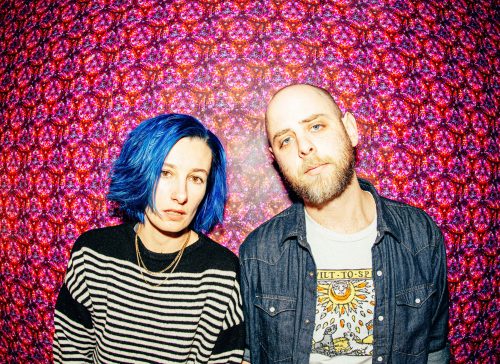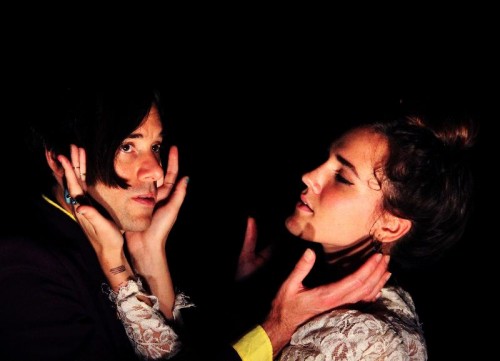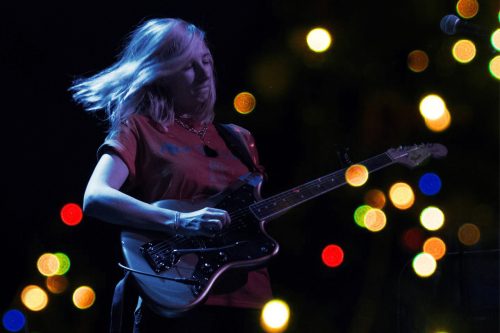Slothrust is focused on three releases right now: “I Promise,” an EP released in the fall; “Of Course You Do,” which is having a 10th-anniversary moment on tour; and a new album the duo of Leah Wellbaum and Will Gorin are working on.
“We’ve been working on some new tunes during our time off from touring the 10-year anniversary of ‘Of Course You Do.’ It’s been a busy touring year so it is taking some time but we are very excited about the material we’ve been working on so far!” Gorin says.
Wellbaum and Gorin met as jazz students at Sarah Lawrence College, just north of New York City. While their thick, heavy metal-flavored brand of hard rock will likely not be performed at the Village Vanguard any time soon, musical chops are a part of the group’s sound on record and live, as we noted in our review of their show supporting Manchester Orchestra in 2021.
That said, its also a band who dedicated more than half of the recent EP to versions of “Pony,” a song by R&B star Ginuwine.
We recently caught up with Gorin via email — with a cameo from Wellbaum — about all things Slothrust ahead of a Northeast swing of dates, including May 2 at First Unitarian Church in Philadelphia and Music Hall of Williamsburg on May 3.
Is this the first time you’ve played an album in its entirety on tour as you are doing with “Of Course You Do?”
We’ve always liked to perform our records in entirety at least once for the album release show but we’ve never done a full tour where we play a record in entirety every single night.
How do you feel about “Of Course You Do” after 10 years?
I feel old! I’ve always loved that record, and it’s been a total blast of nostalgia playing these songs every night. It’s been funny to compare these songs to our newer material. I would say OCYD is Slothrust at our most primal and authentic self. The songs are challenging in a way that I wasn’t expecting, riddled with tempo changes, extreme dynamics, and linear arrangements. It requires a lot of mental presence and physical demand.
What do you remember about those sessions and the live dates in support of the album?
My memory has almost romanticized the experience. It was those days of post-college, early 20’s, working a restaurant gig while simultaneously gigging and recording. Back when I had the energy to do everything and the grind felt like a rite of passage. I can almost smell the weed, coffee and bodega bacon egg and cheese ruminating in the control room of Spaceman Sound Studios in Brooklyn, NY. This recording process was very different from how we do things now. It was more of capturing the best performance of each song as a three-piece in the room. No metronomes and therefore no comping (of the drums).
How has the dynamic in the band changed since those days?
The dynamic within the band has always been the same more or less. What’s changed is the industry itself. When we started as a band, Instagram wasn’t a thing. Social media was not really a part of the business at all. That’s probably one of the biggest dynamic changes we’ve experienced. Neither of us are particularly savvy with social media so it’s been an uphill battle but we are trying! Those days were more about making and performing music as a cathartic release, it was fun, it was passion, it was local community. As the band grew, and we got older with more responsibilities and bills, we started taking things more seriously. Now it’s so much more than the music, it’s a full-fledged small business, managing employees, inventories, budgets, expenses, profit margins, overhead and other business buzzwords.
Why did you decide to record Ginuwine’s “Pony?”
I’m not 100% sure how this came to be. My recollection is that we joked about covering this song for years and then one day, we had booked some studio time to record some new demos and just kinda decided to go for it. We didn’t flesh out an arrangement or even really talk about it all that much, just kinda naturally fell into the heavy chorus, groovy verses vibe right away while we were dialing in sounds for recording.
What were you trying to bring to the track that wasn’t really part of the original?
I think we brought in and really utilized extreme dynamics common in rock music but less so in the pop/RnB genres. Loud, heavy choruses contrasted by groovy tight verses. We also injected the instrumental with musicianship. A lot of pop music is often made by one person on a computer/keyboard programming most if not all of the parts. We kinda took the elements of pop production but performed everything on real instruments. At the end of the day, we are all about instrumental performance.
You took it a step further with a 13-minute extended version, an instrumental version and an a capella version. Why? Do you guys really love this song? Are you making fun of it?
Well, Leah had a vision to pay homage to Ginuwine’s genius marketing vision from the original release of the song. Which was a “Cassingle” featuring four versions of the song including an instrumental and acapella version. We are also a band that was born out of improvisational music. This felt like a perfect opportunity to stretch our legs if you will and just have some fun in the studio. It was a true pleasure to have Brooks Allison on bass for that session. He was such a natural improviser and he and I immediately fell into that drum and bass lock so we had to take full advantage of the moment.
Maybe a question for Leah, but: What does the song mean now being sung from a woman’s perspective?
I love a queer reimagining of a radio hit. As a gender-fluid person, I want to make music that empowers people to embrace whatever role is calling to them in the moment, be it the pony, the rider, or both. Get free and stay free!
Has Ginuwine heard the song? Have you heard from him or what he thinks of it?
I’m not sure if Ginuwine has heard the song….We hoped that after getting the song back on the charts would maybe grab his attention. Who knows, maybe he has heard it and is too shy to reach out. Ginuwine, if you’re reading this, please reach out and let us take you out for lunch!
“Somewhere Over the Rainbow” is another cool take on an older song. What was the intent here? Are you playing double bass drums on it?
The intent here was really coming up with a cool drum and bass moment to help add some dynamic to our live show. I remember Brooks and I stayed late after one of our few rehearsals before our first tour with him on bass. I wanted to come up with something epic but “on brand” and since this was on the “Parallel Timeline” record cycle, which was riddled with rainbow iconography, it kinda just popped in my head. Brooks and I, who had bonded over our love of sludge metal, just kinda went right into this barely giving it any thought, we just let it happen. I remember looking at each other after and giggling being like, “ummmm yeah that was siiiiick.
Is there anything I didn’t ask about that you’d like readers to know?
We are super stoked to have one of my all-time favorite bands Weakened Friends on this tour with us! Their last album “Quitter” is one of my desert island records and it’s just a perfect match for us. Make sure you come early to check them out! You will not regret it! We have also commandeered the one and only Annie Hoffman on bass for us for this tour. She is a legend and I’m so thrilled with the energy she has been bringing to the set every night.
Slothtrust will perform at First Unitarian Church in Philadelphia on May 2 and Music Hall of Williamsburg on May 3
Photo by Bella Petro




Leave a Reply